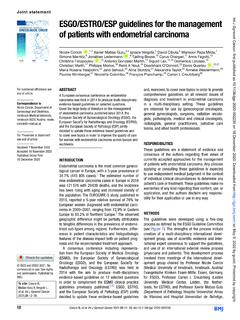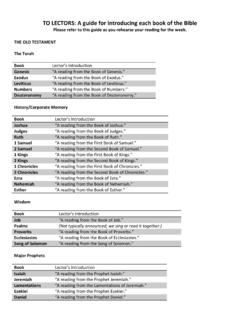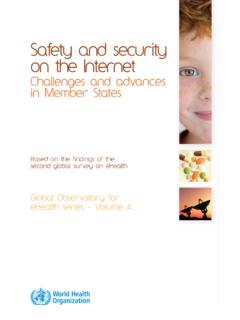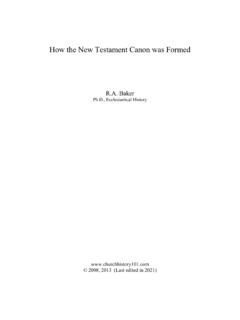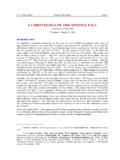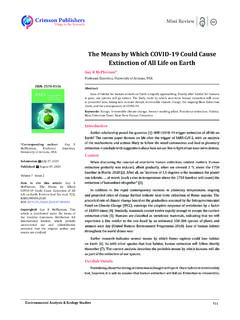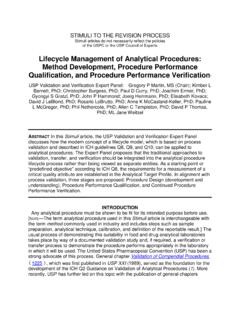Transcription of EPHESIANS: A BACKGROUND STUDY
1 ephesians : A BACKGROUND STUDY by Massimo C. Mollica Submitted in partial fulfillment of the requirements For the degree of Master of Divinity The Master s Seminary Sun Valley, California February 15, 2007 Box #198 CONTENTS Introduction .. 1 Authorship of ephesians .. 1 Assessment of the Impersonal Nature of ephesians .. 3 Assessment of the Different Theological Emphases in ephesians .. 5 Assessment of ephesians Dependence on Colossians .. 7 Final Assessment of the Authorship Issue .. 8 Destination of the Epistle .. 9 The Dating of the Epistle .. 10 Historical BACKGROUND of ephesians .. 11 The City of Ephesus .. 11 The Pagan Religion of Ephesus .. 13 Judaism in Ephesus .. 16 Ephesian Church History .. 16 The Themes and Purpose of ephesians .. 19 Bibliography .. 23 1 Introduction The book of ephesians is charged with weighty doctrines that reveal the glory of the Triune God.
2 Father, Son, and Spirit are seen in Paul s epistle to the ephesians as operating from before the foundation of the world for the redemption of the church. Paul s doctrine of the church shines in ephesians unlike any other epistle. It serves to humble the reader, stimulate lofty thoughts of God, motivate worship, and encourage Christ honoring conduct. It has received no shortage of attention by men throughout history. Alongside Romans, the epistle to the ephesians towers over Paul s thirteen known epistles in its exaltation of the glory of God and His grace toward the church. Therefore, prior to carefully exegeting ephesians , it is important to gain an understanding of the epistle s authorship, its recipients, its historical BACKGROUND , and its themes and central message. Authorship of ephesians To the casual reader of the epistle to the ephesians , it is immediately clear that the author testifies to his own identity.
3 The opening verse reads, Paul, an apostle of Christ Jesus by the will of God .. (Eph 1:1). 1 The writer again identifies himself as Paul in 3:1. However, in spite of the clear claim to pauline authorship, scholars in the last few centuries have found reason to doubt that the apostle Paul really wrote the letter . Prior to investigating the claims of these scholars, an assessment of the internal evidence of the epistle and the evidence provided in the writings of the early church will be summarized. 1 All Biblical texts are taken from the New American Standard Bible (1995 Update Edition), unless other wise noted. 2 As stated, the writer of the epistle clearly claims to be the apostle Paul (1:1, 3:1). If the writer is indeed the apostle Paul, one would expect that any personal testimony of the author within the epistle would be consistent and not contradictory with what is known about the apostle Paul.
4 In 3:1-13, the apostle Paul identifies himself as a prisoner for the gospel (see also 4:1, 6:20) and as the apostle to the Gentiles (see also Gal 2:7-8). This of course is consistent with what is known about the apostle Paul during this time period. Therefore, the personal testimony of the author is consistent with pauline authorship. The testimony of the early church provides overwhelming support to the claim of pauline authorship. In fact, it was not until the end of the eighteenth century that the first challenges to pauline authorship The writings of early church history not only frequently mention or reference this epistle, but they also attest to pauline Irenaeus, in reference to ephesians 5:30 said, even as the blessed Paul declares in his Epistle to the ephesians , that we are members of His body, of His flesh, and of His bones.
5 Irenaeus attributed ephesians to Paul on other occasions also. In addition, Marcion, the Muratorian Canon, and Tertullian all attested to pauline authorship. Peter O Brien notes, In the third century it was regularly attributed to Paul by both the orthodox and their heretical opponents. 4 2 Peter T. O Brien, The letter to the ephesians , The Pillar New Testament Commentary, (Grand Rapids, MI: William B Eerdmans Publishing Company, 1999), 4. 3 For a brief summary of reference to the ephesians in the writings of the early church, refer to Harold W. Hoehner, ephesians : An Exegetical Commentary (Grand Rapids, MI: Baker Academic, 2002), 2-6. 4 O Brien, ephesians , 4. 3 On account of the internal evidence and the early church s attestation it is clear that the apostle Paul was the author of ephesians .
6 Therefore, the burden of proof is on those who doubt or reject pauline authorship. There are various reasons provided by those who reject the traditional view of pauline authorship. For example, Andrew Lincoln sets forth four reasons that when their cumulative force is considered lead him to reject pauline First, the point of view of the author of ephesians evidences an author later than the apostle Paul. Second, the theological emphases in ephesians are too different from Paul s other epistles. Third, the language and style of ephesians is significantly different from those letters whose pauline authorship is undisputed. Fourth, the close relationship of ephesians to Colossians is evidence that somebody other than Paul copied the epistle. The three reasons that I consider to be most compelling will be Assessment of the Impersonal Nature of ephesians The primary reason that some believe the point of view of the author evidences an author later than Paul is the letter s impersonal tone.
7 In 1:15 the author speaks of having heard of the ephesians faith, as if he was not previously acquainted with it before someone told him. In 3:2-4 Paul has to remind or inform them of his apostleship as if they had never heard of it. Because Paul had planted the church in Ephesus (Acts 19), he would have been familiar with their faith already and they would have been familiar with his apostleship. According to C. Leslie Mitton 5 Andrew T. Lincoln, ephesians . Word Biblical Commentary. vol. 42. (Dallas, TX: Word, 1990), lx-lxviii. 6 It is beyond the scope of this brief BACKGROUND STUDY to evaluate the entire debate over authorship. For a full treatment, reference Hoehner, ephesians , 2-61. 4 these verses make it clear that the writer and the readers were unknown to each other.
8 7 Lincoln states, Missing is his personal presence of the undisputed letters with its passion, urgency, joy, and anger .. The tensions and struggles of Paul s ministry are no longer apparent. 8 This leads Lincoln to reason that someone other than Paul wrote the letter . Furthermore, he argues that his view is supported by the lack of personal greetings that Paul s other letters contain. All of this reasoning does not hold up under further scrutiny. Paul does not include personal greetings in 2 Corinthians, Galatians, Philippians, or 1 and 2 Thessalonians, all books in which pauline authorship is rarely The impersonal character of the letter could be due to the fact that the letter may have been addressed to various churches in the area of Ephesus. The greeting in 1:1 is To the saints who are at Ephesus , not to the church at Ephesus.
9 As Harold Hoehner states, Hence, it is reasonable to think that this letter would go to the many satellite churches in a wide geographical area and thus lack the personal Given the fact that it may have been five to six years since his visit to Ephesus, the church certainly would have experienced growth during this time such that other churches may have been planted in the vicinity. Therefore, Paul could be speaking of hearing of the faith of the ephesians because there were new believers that were not there at the time he was. Therefore, the impersonal nature of the letter does not demand an author different than Paul. 7 C. Leslie Mitton, ephesians , (London, England: Marshall, Morgan and Scott, 1976), 3. 8 Lincoln, ephesians , lxiii. 9 Hoehner, ephesians , 22.
10 10 Ibid., 23 5 Assessment of the Different Theological Emphases in ephesians Non- pauline authorship advocates highlight the differences between the theological emphases of ephesians and the emphases of other widely accepted pauline letters as evidence that Paul was not the As Hoehner does, it is best to break down the differences into soteriological, ecclesiological, and eschatological categories. With respect to soteriology, Paul does not focus on the cross of Christ in ephesians (except for in 2:16), as if it is no longer important. Instead the author of ephesians focuses on the resurrection of Christ and His Lordship over all things. Furthermore, Paul does not speak of having died with Christ, but rather having been raised with Christ. It also appears that Paul contradicts what he says in Romans where he asserts the law is not abolished by the gospel (Rom 3:31) and ephesians 2:15 speaks of abolishing the law.
